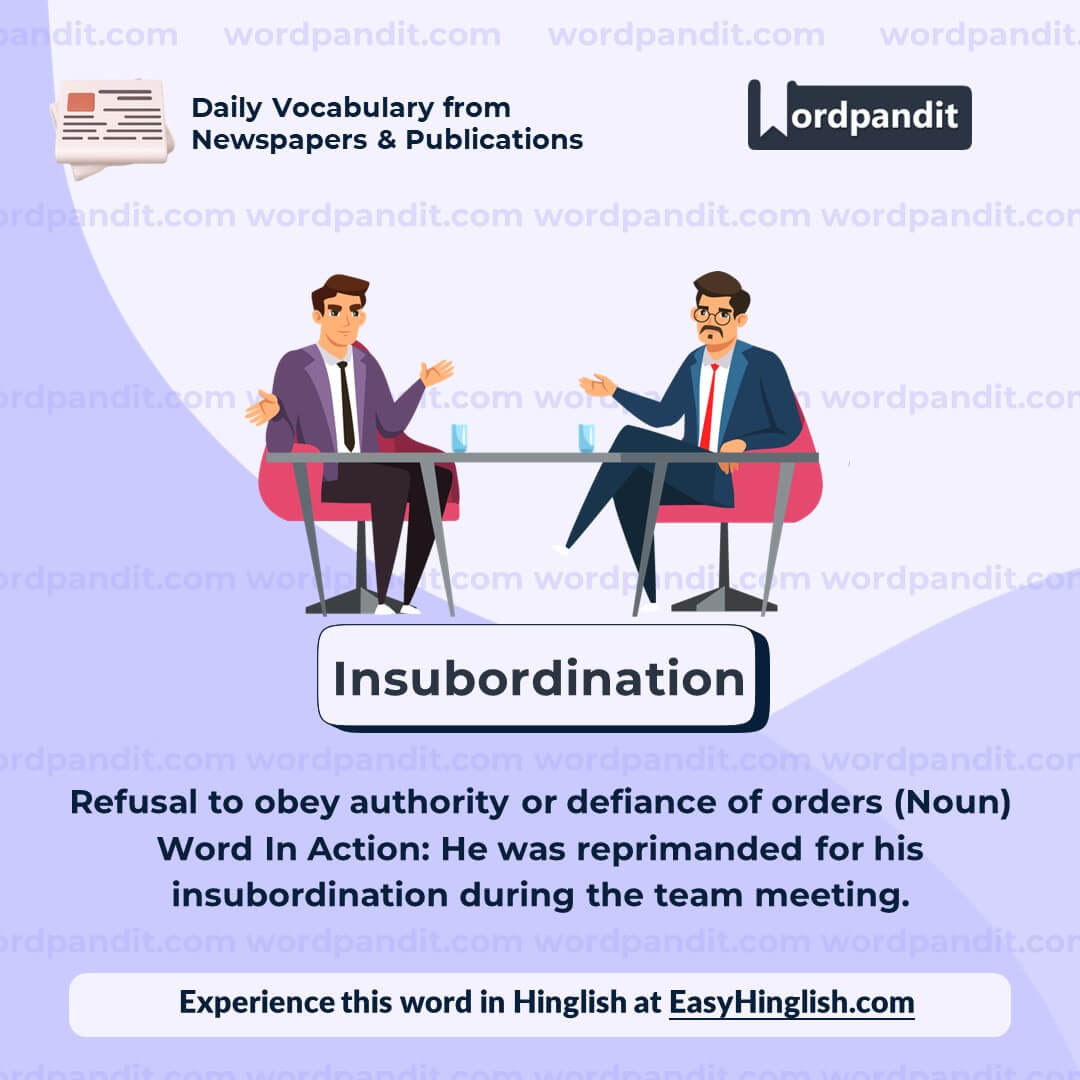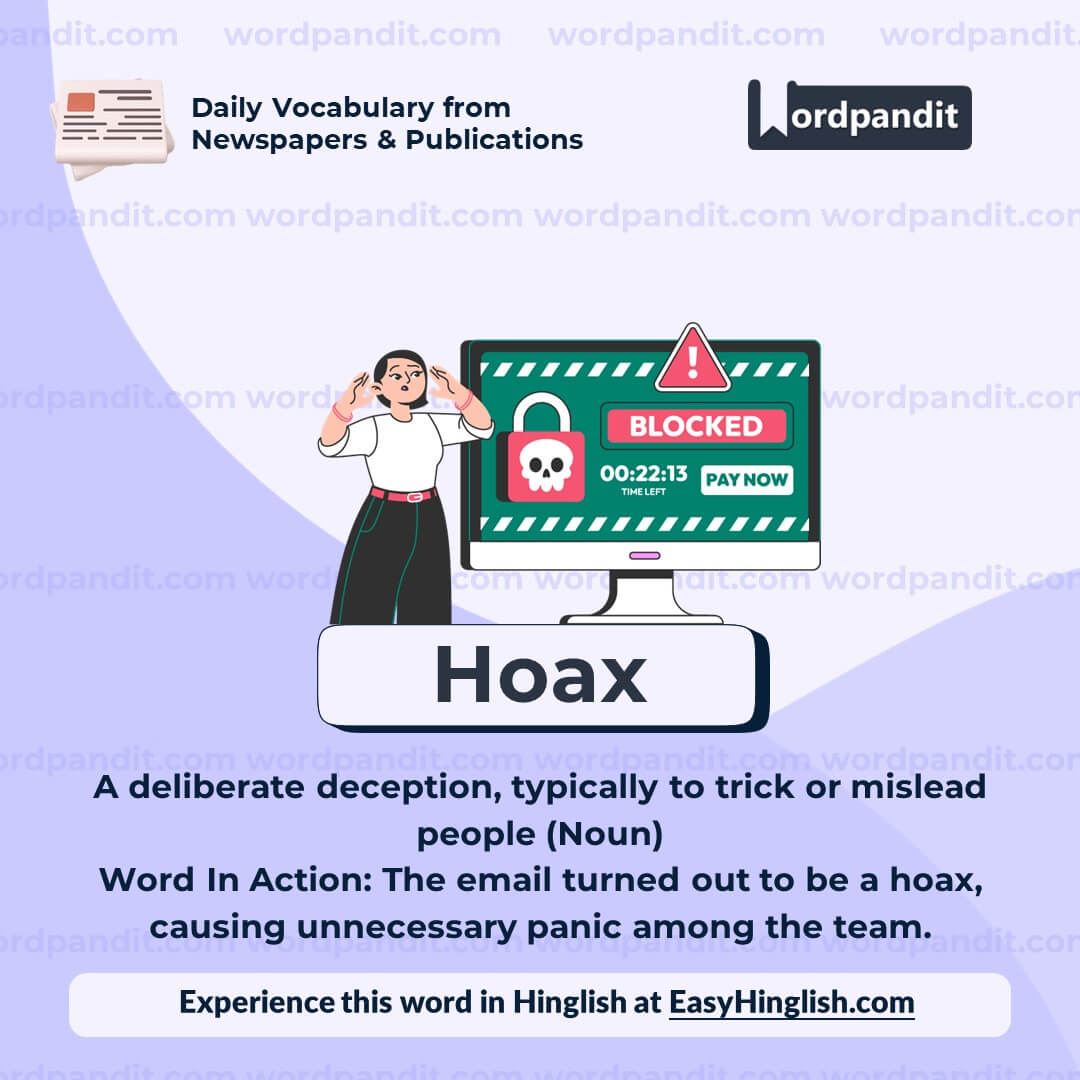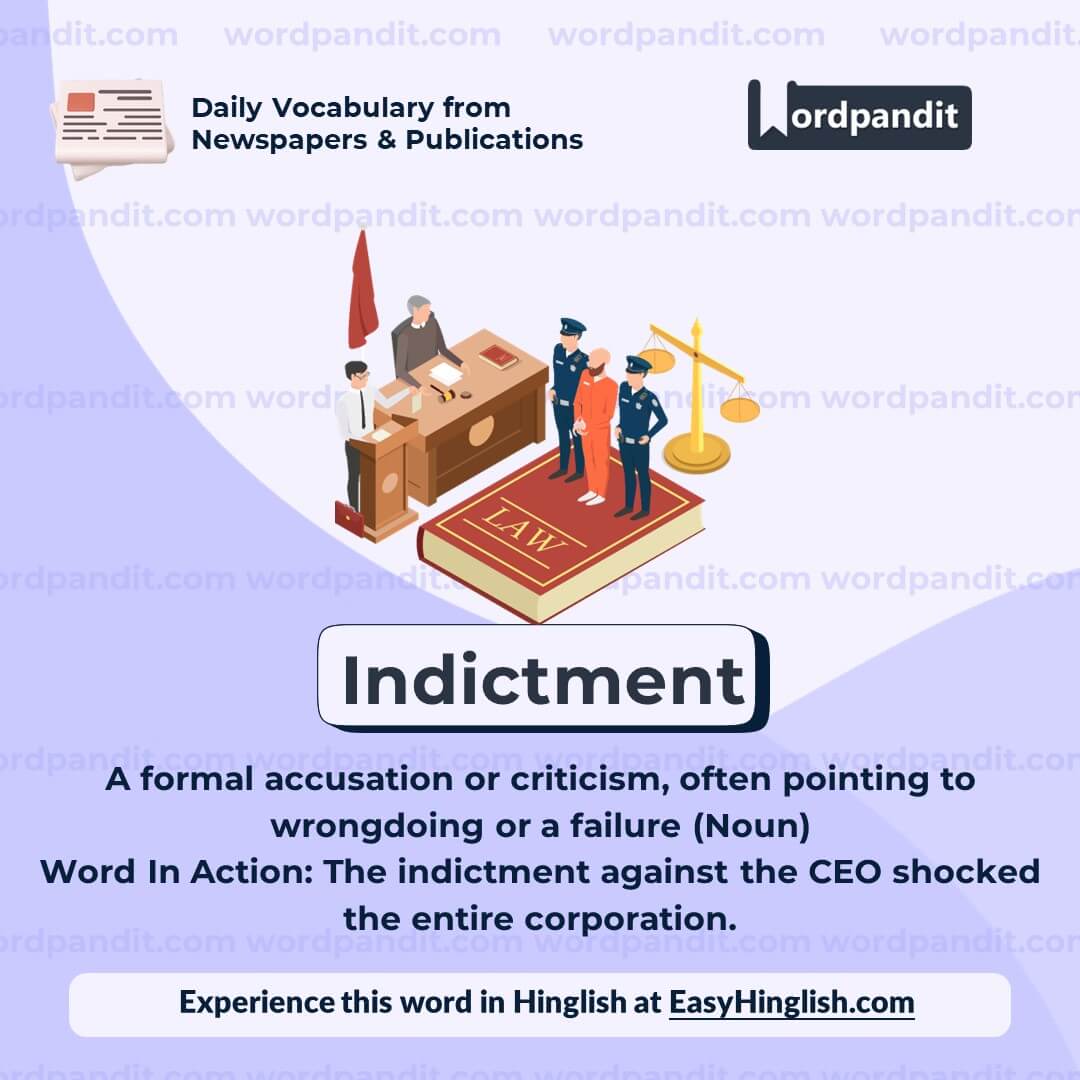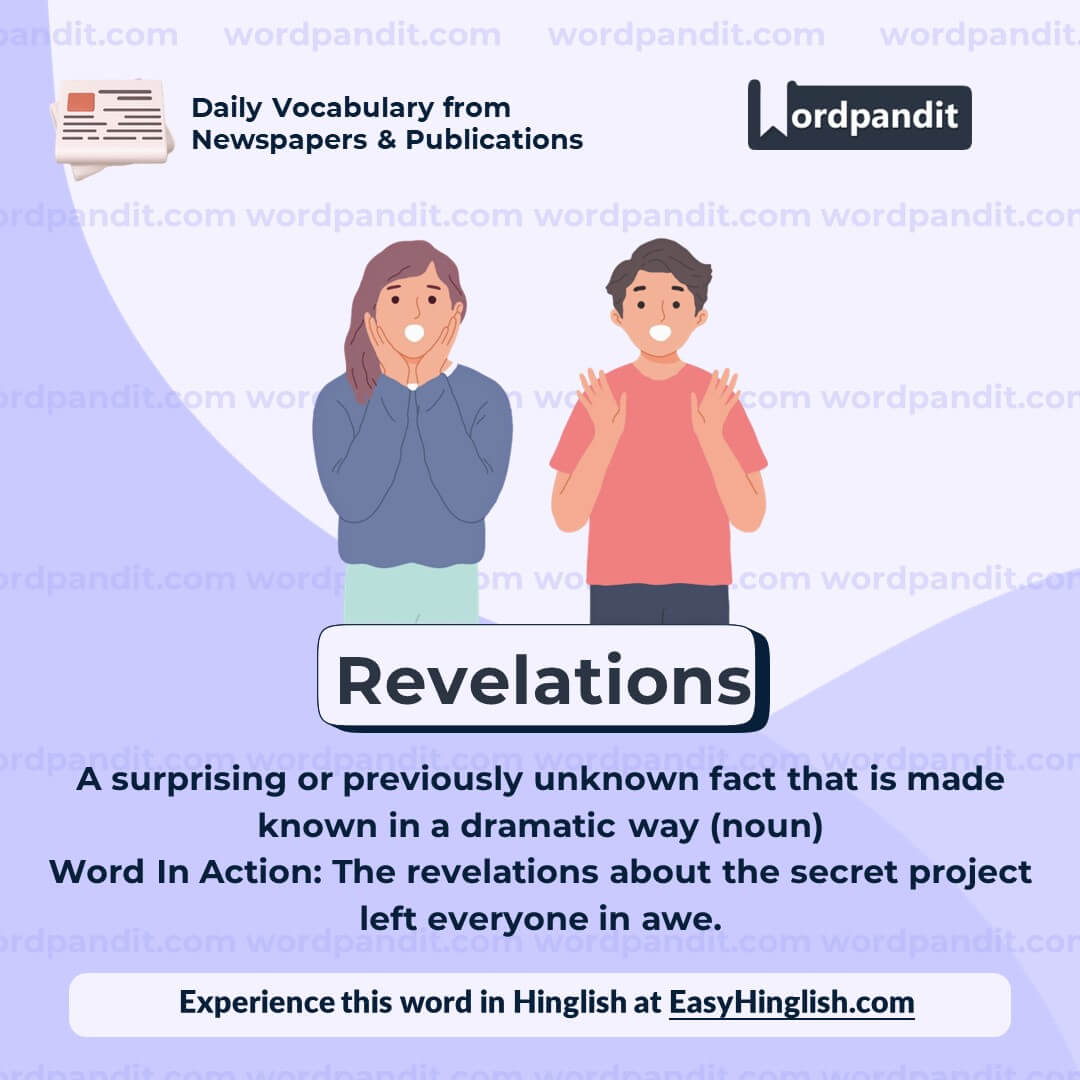Daily Vocabulary from International Newspapers and Publications
Expand Your Vocabulary with Wordpandit’s Global Vocabulary Hub
At Wordpandit, we are committed to helping you develop a truly global vocabulary by drawing from some of the most respected international publications. This section is designed to keep you ahead of the curve by introducing you to words that define global conversations and trends.
The Power of Global Sources
To help you think and communicate on a global scale, we curate vocabulary from renowned international sources, such as:
- The New York Times
- The Washington Post
- BBC
- The Guardian
- The Economist
- Scientific American
- Psychology Today
- And many more...
Stay Global, Stay Competitive
Our daily updates from international publications ensure you are consistently exposed to new words that reflect global news and developments, making sure your vocabulary is not only current but also globally relevant.
Enhance Your Global Perspective
Whether you’re preparing for international exams, aiming to excel in global business communication, or want to enhance your language skills for personal growth, Wordpandit offers the resources you need to thrive in a global context.
Effective Learning, Global Reach
Our learning methodology combines global examples, memory aids, and interactive activities, allowing you to internalize new words effectively and apply them in real-world scenarios.
Begin Your Global Vocabulary Journey Now!
Why Choose Wordpandit?
Practical Learning: Focus on words you'll actually encounter in real-world reading, enhancing your comprehension and communication skills.
Diverse Content: From current affairs to scientific breakthroughs, our varied sources expose you to vocabulary across multiple domains.
Effortless Integration: Make Wordpandit a part of your daily routine. Just a few minutes each day can significantly boost your lexicon over time.
Your Path to Vocabulary Mastery
- Visit our Daily Vocabulary section regularly
- Explore new words and their usage in context
- Practice incorporating these words into your own writing and speech
- Track your progress as your vocabulary expands
Start Your Journey Today
Embark on your vocabulary enhancement journey with Wordpandit. By consistently engaging with our daily posts, you'll build a robust vocabulary that serves you well in academic, professional, and personal contexts.
Remember, a word a day keeps linguistic limitations at bay. Make Wordpandit your daily companion in the quest for vocabulary excellence!
WORD-1: Insubordination
Context:
"People’s ability to carry out ‘petty acts of insubordination’" - Aeon
Explanatory Paragraph:
Insubordination refers to the act of defying authority or refusing to follow orders. It is typically used in contexts where individuals deliberately choose not to comply with the directives of a superior, often as a form of resistance or protest. While it might be perceived negatively in hierarchical organizations, it can also represent a subtle way of challenging unjust systems or asserting personal autonomy.
Meaning: Refusal to obey authority or defiance of orders (Noun)
Pronunciation: in-sub-or-din-ay-shun
Difficulty Level: ⭐⭐⭐ Intermediate
Etymology: Derived from the Latin prefix "in-" meaning "not," and "subordinare," meaning "to place in order or rank," combined to mean "not placing oneself under authority."
Synonyms & Antonyms:
Synonyms: Defiance, rebellion, disobedience, mutiny
Antonyms: Obedience, compliance, submission, subservience
Usage Examples:
- The employee was fired for insubordination after refusing to follow the manager's instructions.
- Acts of insubordination among the students were seen as protests against the school’s outdated policies.
- Her insubordination was interpreted as a bold statement against the oppressive corporate culture.
- The captain was court-martialed for insubordination when he openly challenged his superior officer’s orders.
Cultural Reference:
"In George Orwell’s novel 1984, petty acts of insubordination, such as secretly keeping a diary or refusing to adhere to oppressive societal norms, serve as small but significant acts of resistance against the totalitarian regime." - Literature
Think About It:
When, if ever, is insubordination justified? Can defying authority lead to positive social change, or does it always cause disruption?
Quick Activity:
Write a short paragraph about a time when insubordination might have been necessary to challenge an unfair rule or system. Reflect on whether the act was justified.
Memory Tip:
Think of "in-" (not) + "subordination" (submitting to authority) = refusing to submit to authority!
Real-World Application:
In workplaces, insubordination often leads to disciplinary actions, but in broader societal contexts, acts of defiance can sometimes catalyze reform or draw attention to systemic issues, such as in civil rights movements or protests.
WORD-2: Hoax
Context:
"Coverage of the ‘balloon boy’ hoax forms a withering indictment of for-profit news" - Aeon
Explanatory Paragraph:
A hoax is a deliberate act of deception intended to trick people into believing something false. Hoaxes are often designed for entertainment, publicity, or to manipulate public opinion. While some hoaxes can seem harmless, others can have serious consequences by spreading misinformation or eroding trust in institutions.
Meaning: A deliberate deception, typically to trick or mislead people (Noun)
Pronunciation: hohks
Difficulty Level: ⭐⭐ Beginner
Etymology: Originating in the late 18th century, the word "hoax" is believed to come from the word "hocus," a shortened form of "hocus-pocus," which referred to magic or trickery.
Synonyms & Antonyms:
Synonyms: Deception, fraud, trick, ruse, prank
Antonyms: Truth, fact, reality, authenticity
Usage Examples:
- The news outlet issued an apology after it was revealed that the sensational story was nothing more than a hoax.
- The famous alien autopsy video from the 1990s turned out to be an elaborate hoax created for publicity.
- She was furious to discover that the message about winning a prize was a cruel hoax designed to steal personal information.
- History is full of famous hoaxes, from Piltdown Man to crop circles, each revealing our tendency to believe the extraordinary.
Cultural Reference:
"The ‘balloon boy’ hoax of 2009 involved a family claiming their six-year-old son was trapped in a runaway helium balloon. The incident received massive media coverage, only for it to later be revealed as a publicity stunt orchestrated by the parents." - Modern Media History
Think About It:
Why are people so easily drawn to believing hoaxes? How can we guard against falling for deception in a world of constant media consumption?
Quick Activity:
Research a famous historical hoax and write a few sentences about its impact. Did it have any long-lasting effects on society or the media?
Memory Tip:
Remember the word "hoax" by associating it with "hocus-pocus," a term often used to describe tricks or illusions.
Real-World Application:
Hoaxes are increasingly common in the age of social media, where misinformation can spread rapidly. Being skeptical of sensational claims and fact-checking information are crucial skills to avoid being misled by such deceptions.
WORD-3: Indictment
Context:
"Coverage of the ‘balloon boy’ hoax forms a withering indictment of for-profit news" - Aeon
Explanatory Paragraph:
Indictment is a strong expression of disapproval or accusation, often directed at a person, organization, or system. The term is commonly associated with legal proceedings, where it refers to a formal charge of a crime, but it can also be used metaphorically to criticize a larger issue or failure in society.
Meaning: A formal accusation or criticism, often pointing to wrongdoing or a failure (Noun)
Pronunciation: in-dite-ment
Difficulty Level: ⭐⭐⭐ Intermediate
Etymology: Derived from the Latin word "indictare," meaning "to proclaim" or "to declare," which later evolved into the Middle English "enditen" (to accuse or charge).
Synonyms & Antonyms:
Synonyms: Accusation, condemnation, allegation, criticism
Antonyms: Praise, commendation, approval, vindication
Usage Examples:
- The report was a scathing indictment of the company’s failure to address workplace discrimination.
- The increasing poverty rates serve as an indictment of the government's ineffective economic policies.
- The grand jury issued an indictment against the CEO for alleged fraud and embezzlement.
- The novel is a powerful indictment of the social inequality that persists in modern societies.
Cultural Reference:
"Harper Lee's classic novel To Kill a Mockingbird can be seen as an indictment of racial injustice in the American South during the 1930s, as it highlights the flaws in the legal and social systems of the time." - Literature
Think About It:
How can criticism or an indictment of a flawed system lead to meaningful change? Are there examples where public indictments helped improve society?
Quick Activity:
Write a sentence using "indictment" metaphorically to criticize a societal issue or cultural trend you find troubling.
Memory Tip:
Think of "indictment" as "in" (towards) + "dict" (declare or speak). It signifies declaring accusations or strong criticism towards someone or something.
Real-World Application:
Indictments, whether in the legal sense or metaphorically, are tools for holding individuals, organizations, or systems accountable. In journalism and activism, they are often used to shed light on corruption, systemic failures, or social injustices, sparking conversations and calls for reform.
WORD-4: Revelations
Context:
"Further revelations made it clear that it was the news media that had been launched on a wild ride, falling for what was apparently a cynical publicity stunt orchestrated by Heene." - Aeon
Explanatory Paragraph:
The word "revelations" refers to surprising or previously unknown facts that come to light, often shedding new understanding on a situation or event. It is frequently used in contexts involving discoveries, disclosures, or sudden realizations that change the way people perceive something.
Meaning: A surprising or previously unknown fact that is made known in a dramatic way (noun).
Pronunciation: reh-vuh-LAY-shunz
Difficulty Level: ⭐⭐⭐ Intermediate
Etymology: The word "revelations" comes from the Old French "revelacion," derived from the Latin "revelare," meaning "to unveil" or "lay bare."
Synonyms & Antonyms:
Synonyms: Disclosure, discovery, unveiling, confession, exposure
Antonyms: Concealment, suppression, cover-up, secrecy
Usage Examples:
- The documentary was full of shocking revelations about the corruption within the organization.
- Her sudden revelation about her past took everyone by surprise at the family gathering.
- The scientist’s revelations about the new vaccine's effectiveness brought hope to millions.
- In the novel, the protagonist's final revelation changes the entire narrative for the reader.
Cultural Reference:
The term "revelations" is prominently associated with the biblical "Book of Revelation," which describes apocalyptic visions and prophetic disclosures about the end of times. This religious connection underscores the word's connotation of significant, often awe-inspiring disclosures. - Public Domain
Think About It:
How do revelations, whether personal or public, influence our understanding of truth and trust in the people or institutions involved?
Quick Activity:
Write down a situation where you experienced or learned about a major revelation. Reflect on how it changed your perspective or understanding.
Memory Tip:
Think of the word "revelation" as "reveal-ation," which helps you remember that it means the act of revealing or uncovering something significant.
Real-World Application:
The word "revelations" is commonly used in news and media when describing important disclosures, such as in whistleblowing cases, journalistic exposés, or autobiographies where hidden truths are brought to light.
WORD-5: Cynical
Context:
"Further revelations made it clear that it was the news media that had been launched on a wild ride, falling for what was apparently a cynical publicity stunt orchestrated by Heene." - Aeon
Explanatory Paragraph:
The word "cynical" describes an attitude of deep distrust toward others, often assuming that their actions are motivated by selfishness, manipulation, or deceit rather than genuine intentions. It reflects skepticism about people's sincerity or goodness and is commonly associated with doubt and negativity in assessing human nature or actions.
Meaning: Believing that people are motivated purely by self-interest or acting in a way that shows a lack of trust or faith in the goodness of others (adjective).
Pronunciation: SIN-ih-kul
Difficulty Level: ⭐⭐⭐ Intermediate
Etymology: Derived from the Greek word "kynikos," which referred to the philosophical sect of Cynics, who believed in living simply and dismissing societal norms and values. Over time, the term "cynical" evolved to signify mistrust of others' motives.
Synonyms & Antonyms:
Synonyms: Skeptical, distrustful, pessimistic, disbelieving
Antonyms: Optimistic, trusting, hopeful, naive
Usage Examples:
- The politician’s cynical remarks about his opponent's motives stirred controversy during the debate.
- After being betrayed multiple times, she became cynical about forming new friendships.
- The advertisement was criticized for its cynical attempt to manipulate customers’ emotions.
- Despite his cynical outlook on life, he was pleasantly surprised by the kindness of strangers.
Cultural Reference:
The term "cynical" has roots in the ancient Greek philosophy of Cynicism, practiced by figures like Diogenes of Sinope, who rejected materialism and conventional social values. Over time, their philosophy's name became associated with skepticism about people's motives and sincerity. - Public Domain
Think About It:
Can being cynical ever be beneficial in life, or does it always lead to distrust and negativity? Where do you draw the line between healthy skepticism and harmful cynicism?
Quick Activity:
Write a short paragraph describing a situation where you felt cynical about someone’s intentions. Reflect on whether your doubts were justified or not.
Memory Tip:
Think of the word "cynical" as "sin-ical," reminding you of the belief that people are motivated by "sin" or selfishness, helping you remember its meaning.
Real-World Application:
The word "cynical" is frequently used to describe public reactions to political campaigns, corporate advertisements, or any scenario where the motives behind actions are questioned. Understanding this word helps analyze the skepticism often present in social and professional contexts.


















